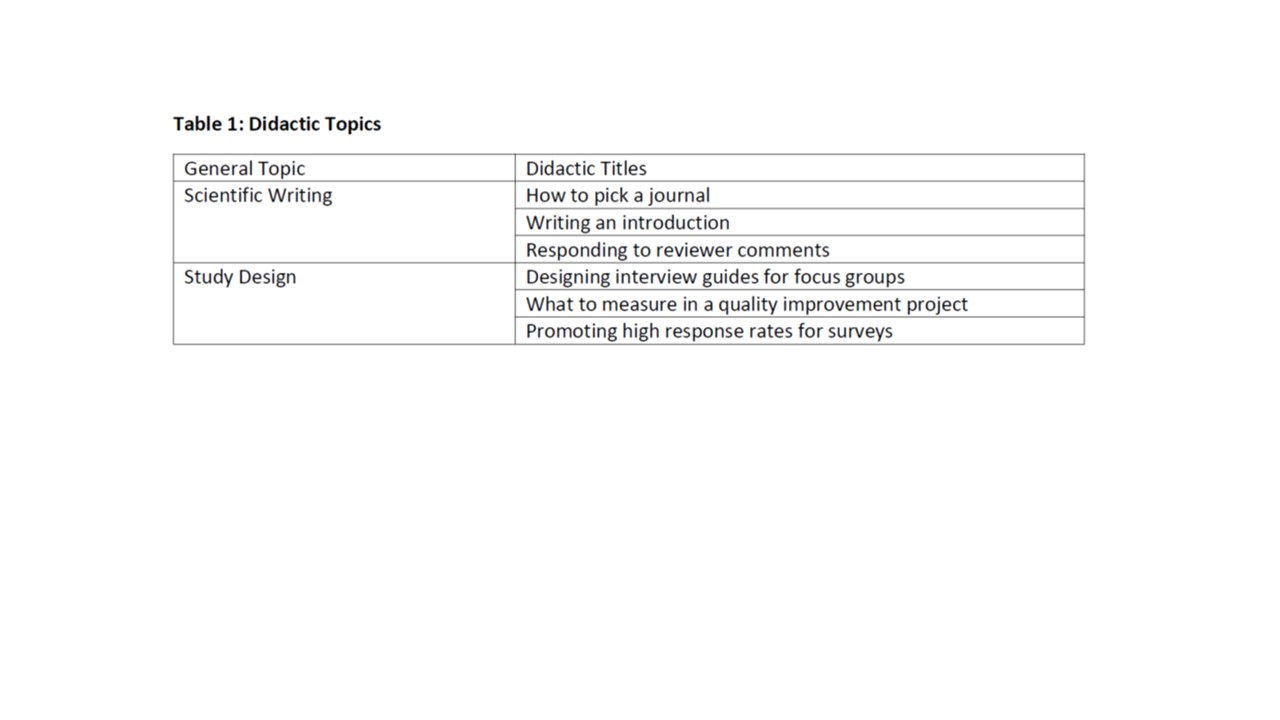Background: Academic hospital medicine faculty often seek career paths in medical education, quality improvement, and/or research. However, few have formal training to develop scholarship in those domains. In recognition of the desire from faculty within our hospital medicine (HM) group for didactics and mentorship to promote scholarship, we created the Hospitalist Faculty Scholars Program (HFSP).
Purpose: To design and develop a hospital medicine specific mentorship and training program for early career HM faculty through guided project development, educational sessions, peer mentorship, and senior mentorship.
Description: In addition to mentorship matched to career interest, the HFSP offers 2 years of structured works in progress sessions and a didactic series for HM clinical instructors or assistant professors planning to pursue promotion within the next 6 years. Mentorship is provided by 5 HM faculty with expertise in medical education, quality improvement, and research who meet with designated mentees individually at least 6 times each year. The two cohorts of the HFSP are comprised of 11 total scholars (10 physicians, 1 nurse practitioner) selected competitively from a pool of applicants. 6 scholars are in the second year of the program and 5 in the first year. The HFSP meets weekly and each scholar presents 3 work in progress sessions each year. Didactic topics are included in Table 1.
Following the first year of HFSP, a recorded focus group with scholars was completed to evaluate the program. The recording was transcribed and coded by 3 individuals using a team-based iterative analytic approach. Results were contextualized using the Social Cognitive Model concept of career self-management in which individuals help direct their own career development. Key themes from the analysis included: (1) peer mentorship and collaboration, (2) accountability, (3) camaraderie, and (4) self-directed development.
Scholars valued peer mentorship and collaborations with other scholars. In one case a collaboration was described as “so organic I didn’t recognize it… growing from here… this was the soil, the top soil…” Scholars also described accountability to one another: “They motivated you because they were all doing stuff… and doing it well… so you didn’t want to be the one failure.” One scholar described the sense of camaraderie: “You have a peer group who… will listen to you and I think multiple people have said this but… each other’s feedback was really valuable…” The theme of self-directed development was expressed: “Learning how to present the work in progress put the onus on us… to… set the agenda versus the agenda being set by whatever leader.”
Conclusions: The HFSP is an innovative program that addresses a key unmet need in hospital medicine. Thus far, the program offers a successful model to encourage early career HM faculty to forge mentorship relationships with designated mentors and with other scholars to accomplish project- and career-related goals. Overall, scholars express a perception that the HFSP promoted development of accountability, camaraderie, and self-directed development.

